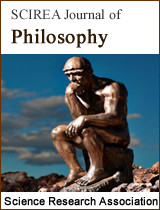ONTOLOGY, DIALECTICS AND 3D PHILOSOPHY
DOI: 10.54647/philosophy72066 84 Downloads 95563 Views
Author(s)
Abstract
Three space experiments carried out in 2004-2018 placed all points on "i" in the discussion about the nature of space-time, which began with the apories of Zeno of Eleia. Experiments have proved that space-time does not exist physically. They are what Democritus called "nothing," unlike "what," which is associated with everything material and virtual that exists in Nature. This discovery requires radical changes in some fundamental paradigms of traditional ontology, which was formed largely under the influence of classical physics of the twentieth century. In addition, it makes it possible to make significant adjustments to gnoseology, in particular, to the question of the meaning of cognition as such. Its decision brings us to a new understanding of the place and role of man in the universe: the former perception of him as a passive observer of phenomena occurring in the world changes to the status of one of the potential demiurges of space.
Keywords
Nature, space, time, ontology, gnoseology, cognition, man, Big and Minor Universes
Cite this paper
Givi Givishvili,
ONTOLOGY, DIALECTICS AND 3D PHILOSOPHY
, SCIREA Journal of Philosophy.
Volume 2, Issue 1, February 2022 | PP. 1-38.
10.54647/philosophy72066
References
| [ 1 ] | A. N. Whitehead. Process and Reality. N.Y. The Free Press, 1978. |
| [ 2 ] | Aristotle. Physics. |
| [ 3 ] | Aristotle. Metaphysics. |
| [ 4 ] | K. S. Tertullian. About the flesh of Christ. 5. |
| [ 5 ] | A. Augustine. Confession. Book 4. XVI. 28-29. |
| [ 6 ] | K. von Reichenbach. Letters on Od and Magnetism 1926. |
| [ 7 ] | https://ru.wikipedia.org/wiki/Vitalism. |
| [ 8 ] | «An Open Letter to the Scientific Community. cosmologystatement.org» (Published in New Scientist, May 22). |
| [ 9 ] | K. Jaspers. Nietzsche and Christianity. 1994. |
| [ 10 ] | C. Darwin. The Autobiography of Charles Darwin 1809-1882. |
| [ 11 ] | М. Gliozzi. History of Physics. 1965. |
| [ 12 ] | A. Einstein. Ether and relativity theory. 1920. |
| [ 13 ] | G. Givishvili. The philosophy of humanism. 2009. (in Russian) |
| [ 14 ] | G. Givishvili. The dialectic of humanism. Bohr logic vs Aristotle logic. 2017. (in Russian) |
| [ 15 ] | https://www.liveinternet.ru/users/3473355/post142170848/2010г. |
| [ 16 ] | E. Di Valentino, A. Melchiorri и J. Silk. (Planck evidence for a closed Universe and a possible crisis for cosmology // Nature Astronomy. 2020. V 4. P. 196–203). |
| [ 17 ] | P. Laurent, D. Götz, P. Binétruy, S. Covino, A. Fernandez-Soto. (Constraints on Lorentz Invariance Violation using integral/IBIS observations of GRB041219A. Physical Review D. V.83. 2011) |
| [ 18 ] | A. Augustine. Confession. Book 11. III-XXIII. |
| [ 19 ] | C. V. Charlier. Celestial mechanic. 1902, 1907. |
| [ 20 ] | Aristotle. Metaphysics. XII,7, 1072b -1073a. |
| [ 21 ] | A. Fomin. Why scientists believe in God. 2005. (in Russian) |
| [ 22 ] | I. Kant. Criticism of pure reason. Chapter II. Chapter 2. Section 3. |
| [ 23 ] | http://www.cogmtl.net/Misc/bk04.htm |
| [ 24 ] | B. Pascal. Thoughts about religion. |
| [ 25 ] | G. Givishvili. Myths. Yesterday, today, tomorrow. 2008. (in Russian) |
| [ 26 ] | G. Stent, R. Calendar. Molecular Genetics An Introductory Narrative. 1987. |
| [ 27 ] | G. Givishvili. "Does natural science have an alternative to God?" VF, NO. 2. 1995. (in Russian) |
| [ 28 ] | G. Givishvili. "Dark energy and" super-strong anthropic principle. " VF. №5. 2008. (in Russian) |
| [ 29 ] | G. Givishvili. Evolution of Homo sapiens. Introduction to historiology. 2018. (in Russian) |
| [ 30 ] | Plutarch. "Comparative Biographies. Aristide. " |

